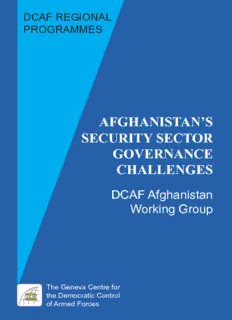
Parliamentary Oversight of the Security Sector in Afghanistan PDF
Preview Parliamentary Oversight of the Security Sector in Afghanistan
DCAF REGIONAL PROGRAMMES AfghAnistAn’s security sector governAnce chAllenges DCAF Afghanistan Working Group The Geneva Centre for the Democratic Control of Armed Forces Published with the generous support of the Ministry of Defence of Latvia DCAF Afghanistan Working Group AFGHANISTAN’S SECURITY SECTOR GOVERNANCE CHALLENGES Geneva Centre for the Democratic Control of Armed Forces (DCAF) www.dcaf.ch The Geneva Centre for the Democratic Control of Armed Forces is one of the world’s leading institutions in the areas of security sector reform (SSR) and security sector governance (SSG). DCAF provides in-country advisory support and practical assistance programmes, develops and promotes appropriate democratic norms at the international and national levels, advocates good practices and makes policy recommendations to ensure effective democratic governance of the security sector. DCAF’s partners include governments, parliaments, civil society, international organisations and the range of security sector actors such as police, judiciary, intelligence agencies, border security services and the military. DCAF Afghanistan Working Group AFGHANISTAN’S SECURITY SECTOR GOVERNANCE CHALLENGES Geneva DCAF Afghanistan Working Group, Afghanistan’s Security Sector Governance Challenges, DCAF Regional Programmes Series # 10 (Geneva: Geneva Centre for the Democratic Control of Armed Forces, 2011). DCAF Regional Programmes Series no. 10 © Geneva Centre for the Democratic Control of Armed Forces Executive Publisher: Procon Ltd., <www.procon.bg> Cover Design: Angel Nedelchev ISBN 978-92-9222-174-4 I NTRODUCTION In recent years, the need for improved public security has become a critical is- sue in Afghanistan. For Afghan citizens, the provision of public security is but one of many governance issues facing society including access to public ser- vices, justice, transparency, accountability and freedom from fear. Democratic institutions, the media and civil society have all ensured that the governance of the security sector, not only at national but international levels, has remained a high profile issue. Moreover, NATO partner-nations have made institution building a central—and legitimating—pillar of assistance rendered through the International Security Assistance Force. In a governance context, it is presupposed that the security sector is trans- parent, accountable, that democratic institutions have appropriate instruments with which to analyse and amend security policy and practice, and citizens are able to voice their security needs to security providers. The challenge in Af- ghanistan remains one of how to create long term solutions to clearly identified security governance problems. In this regard, understanding the capacity de- velopment needs of Afghan institutions will remain crucial in the long term. Since 2007, the Geneva Centre for the Democratic Control of Armed Forces (DCAF) has worked with the National Assembly if Afghanistan, civil society or- ganisations and the Ministry of Defence on security sector oversight needs and good practices. This limited engagement has, nevertheless, been fruitful, and this book contains a series of articles commissioned while DCAF implemented a small-scale project in Afghanistan between 2007 and 2009.1 The intention of the survey was to preliminarily map the security governance needs of Afghanistan and the valuable contributions still reflect the salient as- pects of the challenges facing national and international actors in Afghanistan. Regrettably, three chapters of this ultimately survey could not be published due to the sensitivity surrounding their subject matter, leading, in turn, to a major delay in circulation of this publication. DCAF thanks the remaining authors for their patience and hopes the papers contribute to the wider—and ongoing— 1 For more information please see <www.dcaf.ch/dcaf/Projects/About?lng=en&id=123752>. v vi Afghanistan’s Security Sector Governance Challenges discussion on rendering meaningful security governance assistance to Afghan institutions and society. DDr. Philipp Fluri Deputy Director DCAF December 2010 C ONTENTS PART 1: Reforming the Security Sector Chapter 1 Reconstructing the Defence Sector...........................................................1 Antonio Giustozzi Chapter 2 Reinventing the Police: Output versus Impact.........................................23 Tonita Murray Chapter 3 “The Good, the Bad and the Ugly”: The Privatized Security Sector in Afghanistan .........................................................................................45 Susanne Schmeidl Chapter 4 Cost and Fiscal Sustainability of Afghanistan’s Security Sector..............77 William A. Byrd, Yoichiro Ishihara, and M. Khalid Payenda PART 2: The Role of Institutions Chapter 5 Parliamentary Oversight of the Security Sector in Afghanistan...............89 Oren Ipp Chapter 6 Reforming Afghanistan’s Justice Sector................................................107 John Dempsey Chapter 7 The Dual Face of Subnational Governance in Afghanistan...................123 Hamish Nixon Part 3: Demilitarizing Society Chapter 8 Replacing the Rule of Guns with the Rule of Law: Demilitarization of Afghan Society and Its Impact on Security Sector Reform (The 3Ds Approach: DDR, DIAG and De-mining)..................................141 M. Masoom Stanekzai Chapter 9 Narcotics and Counter-narcotics: Responding to an Irrepressible Market?..................................................................................................159 Adam Pain 2 Afghanistan’s Security Sector Governance Challenges Part 4: Building Local Ownership Chapter 10 The Task of Rebuilding a Human Rights-sensitive Security Sector in Afghanistan........................................................................................187 Ahmad Nader Nadery Chapter 11 Women and Children – Continuing Challenges.....................................199 Ancil Adrian-Paul Chapter 12 The Media and Peace-building in Afghanistan......................................229 Aziz Rafiee Chapter 13 The Role of Civil Society in Security Sector Oversight..........................245 Christian Dennys Part 5: Regional and International Actors Chapter 14 Regional Dimensions of Afghan Security...............................................263 Anna Paterson Chapter 15 The Role of ISAF in SSR in Afghanistan...............................................287 Vahan Galoumian Chapter 16 International, Regional and Bilateral Security Arrangements................303 Vahan Galoumian
Description: